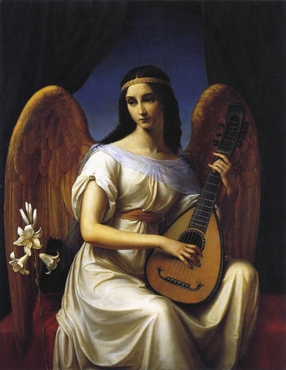
Let's start with the seventh book and two new characters: Lothario and Therese. Lothario is the man who Aurelie loved so deeply and let her deeply upset when he left her; Wilhelm arrives at his castle determined to reproof him for the damage he caused Aurelie but once they meet, Wilhelm thinks he is an honorable man and changes his mind. Furthermore, and we begin with the plot coincidences, Lothario is the Countess’ brother, imagine Wilhelm's distress when he finds out! Therese, in turn, is the woman Lothario left Aurelie for. She is the daughter of a father who loves her but has a weak character and a mother with a very strong character who doesn't love her at all; when the father dies, the mother throws her out but she's an intelligent and talented woman and gets ahead. Lothario and Therese were about to get married but the engagement was broken when he sees a picture of her mother and recognizes her as his former lover.
The most important think that happens in the seventh book has to do with Felix. Wilhelm reproaches Lothario that he is not taking care of Felix properly, his son with Aurelie; his new friend is confused, he doesn't know anything about a child, and Jarno, also Lothario's friend, explains that the boy isn't actually Aurelie's child. One of her servants took him with her when the baby's mother died. Guess what! That servant is Barbara (Wilhelm didn't recognize her while he was at Serlo and Aurelie's house!) and Felix is son of Mariane... and Wilhelm. Contrary to what he thought, the girl stayed always faithful, and now he feels remourseful over leaving her; On the other hand, he feels immensely happy to know that his beloved Felix is his son. After knowing that, Wilhelm returns to Serlo's home; he will take care of Felix and will send Mignon with Lothario's sister, as she also takes care of other orphan girls.
When he goes back to Lothario's castle, and so begins the eighth book, he meets another character he hasn’t seen since he began his journey, his friend and partner Werner; both are very pleased to see each other again and also glad about their good business prospects. Now Wilhelm has settled down and has definitely abandoned the theater, he thinks that his next step should be to give a mother to Felix, and who could be better than the lovely and smart Therese? So he proposes on a letter, just before going on a trip because bad news arrive from Lothario's sister: Mignon is very ill and Wilhelm and Felix should go to see her.
Wilhelm arrives at Lothario's sister and, surprise, surprise, that sister is not the Countess but the Amazon! Now, that he has already proposed Therese marriage! This guy is always so opportune... Let's explain their kinship: Lothario, the Countess and the Amazon are the fair soul’s nephews; Friedrich, Philine’s servant, is the fourth one. Don't you remember that the fair soul talks about an uncle? Natalie lives in his castle, and Wilhelm notices that it houses most of his grandfather's works of art; again a coincidence, the dead uncle bought Wilhelm's grandfather heritage.
However, let’s get to the most important: Mignon. The girl has a heart condition and she has felt extremely weak lately; Natalie warns Wilhelm before he sees her, and also tells him that the girl no longer dresses as a boy. He is surprised because the girl had always fiery opposed to wear woman clothes. Natalie explains that some days ago they had a birthday party for two of her girls; Mignon was disguised as an angel, with a white robe, wings and a lily in his hand. So dressed, Mignon talks to the girls:
- ‘I wish I were,’ said Mignon.
- ‘Why dost thou bear a lily?’
- ‘So pure and so open should my heart be; then were I happy.’
-‘What wings are these? Let us see them!’
- ‘They represent far finer ones, which are not yet unfolded.’
So laßt mich scheinen, bis ich werde;
Zieht mir das weiße Kleid nicht aus!
Ich eile von der schönen Erde
Hinab in jenes feste Haus.
Dort ruh ich eine kleine Stille,
Dann öffnet sich der frische Blick,
Ich lasse dann die reine Hülle,
Den Gürtel und den Kranz zurück.
Und jene himmlischen Gestalten,
Sie fragen nicht nach Mann und Weib,
Und keine Kleider, keine Falten
Umgeben den verklärten Leib.
Zwar lebt ich ohne Sorg und Mühe,
Doch fühlt ich tiefen Schmerz genung.
Vor Kummer altert ich zu frühe –
Macht mich auf ewig wieder jung!
Such let me seem till such I be;
Take not my snow-white dress away!
Soon from this dusk of earth I flee
Up to the glittering lands of day.
There first a little space I rest,
Then wake so glad, to scene so kind;
In earthly robes no longer drest,
This band, this girdle left behind.
And those calm shining sons of morn
They ask not who is maid or boy;
No robes, no garments there are worn,
Our body pure from sin’s alloy.
Through little life not much I toil’d,
Yet anguish long this heart has wrung,
Untimely woe my blossom spoil’d;
Make me again forever young!














Comments powered by CComment